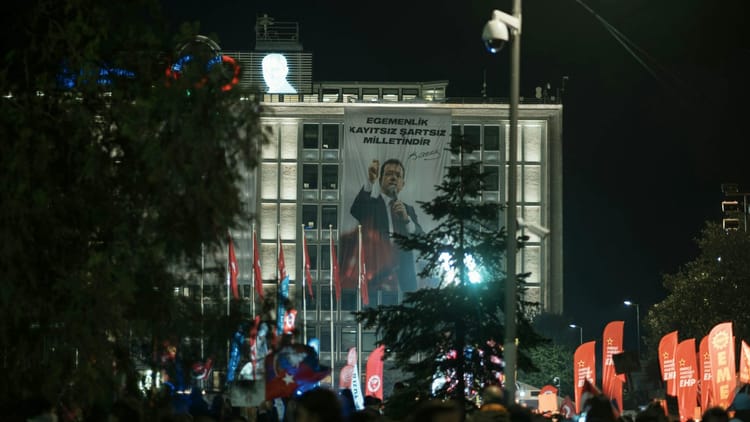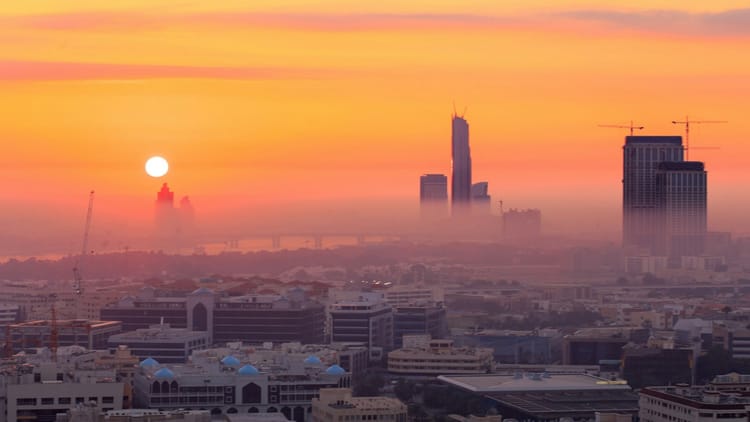The end of a princedom

Recently: Why is Moscow testing a new nuclear weapon? Sergey Radchenko on Vladimir Putin’s atomic threats—and what Western leaders are hearing in them.
Today: Irony will never die. In another moment of consequence from the Epstein scandal, the British king has forced accountability on his brother while the American president’s administration continues to hold FBI and court documents close.
+ For members: What’s driving the collapse of southern Africa’s postcolonial ruling parties? Hussein Solomon on the problems of turning a liberation movement into a government.
& New music from SANAM ...
Andrew Mountbatten Windsor
King Charles III stripped his brother Andrew of his remaining royal titles on Thursday, ordering him out of Royal Lodge, the 30-room Windsor mansion he’s occupied since 2004. Buckingham Palace announced that Andrew will no longer use the title of prince—he becomes Andrew Mountbatten Windsor. The formal eviction follows weeks of mounting pressure after Virginia Giuffre’s posthumous memoir detailed three alleged sexual encounters with Andrew when she was 17, including what she described as an “orgy” involving eight girls who appeared underage. Andrew paid Giuffre millions in a 2022 settlement without admitting wrongdoing. He has consistently denied ever meeting her.
With today’s announcement from the Palace, the Jeffrey Epstein sex-trafficking scandal extends its transatlantic fallout. In U.S. President Donald Trump’s 2024 campaign, he promised transparency on the Epstein files—a collection of Federal Bureau of Investigation and court documents about Epstein’s trafficking network and associates—but months later, his Justice Department has released little of substance. Which has prompted fury from segments of Trump’s supporters, who accuse the administration of protecting his own documented friendship with the financier.
In October, Democrats in the U.S. House of Representatives made pubic documents showing that Epstein attended Trump’s 1993 wedding and maintained contact with him longer than Trump previously claimed. U.S. Attorney General Pam Bondi refused to answer Senate questions about why FBI agents were ordered to flag any documents mentioning Trump during a file review. The biggest question around the scandal remains unanswered: What did powerful figures connected to Epstein know, and when did they know it? Andrew’s fall suggests the question may continue to bring consequences—possibly regardless of whether it brings answers.

Wary of fast fashion?
Shop Congo Clothing Company and
make a difference—in style.
Meanwhile
- Thirty days without a deal. Americans blame President Trump and congressional Republicans more than Democrats for the U.S. government shutdown, according to a Washington Post-ABC News-Ipsos poll released on Thursday. Some 45 percent hold Trump and Republicans responsible versus 33 percent blaming Democrats—up from 30 percent when the shutdown began October 1. The closure reaches day 30 on Thursday. Benefits from SNAP—the U.S. government’s main food-assistance program—run out Saturday for 42 million Americans. Senators expressed cautious optimism about bipartisan talks, but both sides remain at impasse over extending Affordable Care Act subsidies—health insurance assistance expiring at year’s end.
- Framework diplomacy, cont. Trump cut tariffs on Chinese goods from 57 to 47 percent on Thursday after what he called an “amazing meeting” with President Xi Jinping in South Korea—rating it a “12 out of 10.” China paused rare-earth export controls for a year, promised fentanyl cooperation, and said it would resume soybean purchases “immediately.” Yet mechanisms remain vague: How does China demonstrate fentanyl cooperation? What constitutes substantial soybean purchases? Both sides pushed the November 1 deadline back and left hard questions about technology exports aside. Markets rallied anyway. … See “Framework diplomacy.”
- Testing what violations the framework can take. Hamas handed over what it said were the remains of two deceased hostages on Thursday via the Red Cross. On Wednesday, Israel announced the resumption of the ceasefire after Tuesday-night strikes meant the deadliest day since the October 10 truce began. Also on Wednesday, Trump said that “nothing’s going to jeopardize” the deal, adding that if violations should continue, he’d “take out Hamas very easily.” A pattern is holding: Hamas performs compliance while withholding what it promised; Israel documents deceptions while calibrating how hard to push back.
- A democratic transition in Africa. A year ago Thursday, Botswana’s opposition Umbrella for Democratic Change ended the Botswana Democratic Party’s 58-year rule, winning 36 of 61 parliamentary seats. The BDP collapsed to four seats despite securing 30 percent of the vote, and President Duma Boko was sworn in on November 1, 2024. The BDP’s defeat followed comparable electoral shocks across southern Africa in 2024—South Africa’s African National Congress lost its parliamentary majority in May, while Mozambique’s disputed victory by ruling party FRELIMO triggered deadly protests. Now, parties that won independence decades ago are facing younger, urban voters focused on jobs over liberation-era legacies. … See “Great expectations.”
- Melissa moves north. Hurricane Melissa is approaching Bermuda as a Category 2 storm on Thursday after crossing the Bahamas overnight. The death toll climbed to at least 30 across Haiti, Jamaica, and the Dominican Republic—with 23 deaths in Haiti alone, mostly from flooding in the coastal town of Petit-Goâve. Bermuda closed schools and government offices ahead of the storm’s expected close pass Thursday night. Melissa has weakened from its historic Category 5 landfall in Jamaica but maintained 160-kilometer-an-hour winds. Forecasters expect the storm to weaken further as it moves into the open Atlantic by the weekend.

From the files
Great expectations
What’s driving the collapse of southern Africa’s postcolonial ruling parties? Hussein Solomon on the problems of turning a liberation movement into a government.

For the first time since the end of apartheid, the African National Congress failed to win a majority in South Africa’s general elections last year. Three decades earlier, the party of Nelson Mandela led yearslong negotiations to steer the country’s peaceful transition from white rule to democracy—before dominating South Africa’s first free elections in 1994 with 63 percent of the vote.
But that was then. Since 2004, the ANC’s share of the vote declined in every election, as the country’s economy deteriorated and corruption grew—to a point of the president stashing millions in mystery cash in his sofa. In 2025, South Africa’s unemployment rate has fluctuated between 31.9 percent and 33.2 percent—among the world’s highest—with, by some measures, the world’s highest level of income inequality. More than half the country’s population lives in poverty, and the economy grew just 0.6 percent in 2024, its slowest pace since the coronavirus pandemic. The ANC government, meanwhile, struggled to provide electricity and running water. In 2023, the average South African citizen spent almost five hours a day without power.
What went wrong?
Hussein Solomon is a senior professor of political studies and governance at the University of the Free State in Bloemfontein, South Africa. As Solomon sees it, the ANC had become far from Mandela’s party or the organization that spent decades fighting apartheid. Once known for its educated, professional leaders, the party transformed into a cadre of lifelong partisans. Public impressions of the party changed, too, with younger generations having little or no memory of black South Africans’ battle for freedom. The elections in May 2024, Solomon said, revealed that voters were increasingly split along tribal and geographic lines—with long-ranging consequences for the country’s still-young democracy …
Your loyal guide to a changing world.
Membership with The Signal means exclusive access to premium benefits:
- Regular profiles on the questions behind the headlines
- In-depth feature interviews with our network of specialist contributors from across America and around the world
- The despatch, our weekly current-affairs and cultural-intelligence briefing
- Early access to new products, including print extras
It also means vital support for an independent new enterprise in current-affairs journalism.
New music
‘Habibon’
With All Hallows’ Eve upon us, an ethereal, eerie track from Beirut’s SANAM—from their new album, Sametou Sawtan. Here, the sextet plays with traditional Arabic poetry, traditional Arab instruments (like the buzuq), and Auto-Tune technology to create a ballad with a beautiful but temporally disorienting effect.





